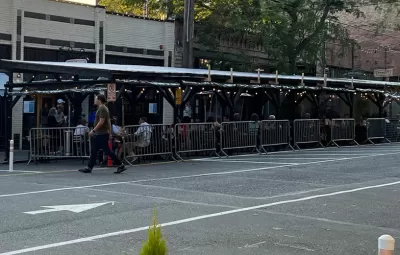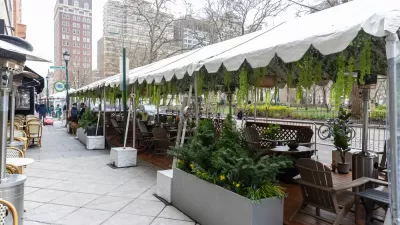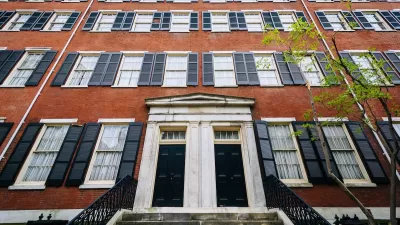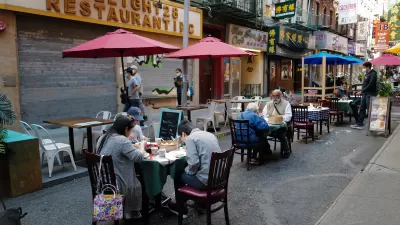Despite the popularity of Ballard Avenue’s outdoor dining pergolas, some district board members argue the patios don’t match the district’s historic character.

The popular outdoor dining patios created during the pandemic in Seattle’s Ballard Avenue Landmark District could be going away, if the district’s board has its way, reports Ray Dubicki in The Urbanist.
Despite widespread community support, some board members see the eateries as an eyesore that “defile the historic district.” One supportive board member challenged the idea that removing the patios in favor of street parking would improve the situation. “Why are we supporting cars instead of economic vitality,” Miriam Hinden asked.
Because of the historic nature of the district, board members want to require elements that would be cost-prohibitive for most business owners. Legally, because of their location on public right-of-way, the structures will always be deemed temporary by the city.
Dubicki points out that this highlights an inherent flaw in historic district guidelines: they don’t account for new concepts such as parklets or dining patios, leaving it up to board members to debate the appropriate number of pergolas on the street and what materials would fit in with the existing character of the neighborhood. Meanwhile, the street cafes “have done more than revitalize a stretch of shops and restaurants that were hard hit by pandemic shutdowns. They’ve become iconic in their own right.”
The original movement to preserve the district is based on economic revitalization, Dubicki notes. “Not a preservation movement. A revitalization movement.” The aesthetic qualities outlined in the historic district guidelines “are subjectively applied to new structures” anyway, Dubicki argues. “A lively Ballard Avenue is completely within the historic character of the district.”
FULL STORY: Ballard’s Historic District Board Looks to Blow the Roof Off Street Cafes

Study: Maui’s Plan to Convert Vacation Rentals to Long-Term Housing Could Cause Nearly $1 Billion Economic Loss
The plan would reduce visitor accommodation by 25,% resulting in 1,900 jobs lost.

North Texas Transit Leaders Tout Benefits of TOD for Growing Region
At a summit focused on transit-oriented development, policymakers discussed how North Texas’ expanded light rail system can serve as a tool for economic growth.

Using Old Oil and Gas Wells for Green Energy Storage
Penn State researchers have found that repurposing abandoned oil and gas wells for geothermal-assisted compressed-air energy storage can boost efficiency, reduce environmental risks, and support clean energy and job transitions.

Private Donations Propel Early Restoration of Palisades Playground
Los Angeles has secured over $1.3 million in private funding to restore the Pacific Palisades playground months ahead of schedule, creating a modern, accessible space that supports community healing after recent wildfires.

From Blight to Benefit: Early Results From California’s Equitable Cleanup Program
The Equitable Community Revitalization Grant (ECRG) program is reshaping brownfield redevelopment by prioritizing projects in low-income and environmental justice communities, emphasizing equity, transparency, and community benefits.

Planting Relief: Tackling Las Vegas Heat One Tree at a Time
Nevada Plants, a Las Vegas-based nonprofit, is combating the city’s extreme urban heat by giving away trees to residents in underserved neighborhoods, promoting shade, sustainability, and community health.
Urban Design for Planners 1: Software Tools
This six-course series explores essential urban design concepts using open source software and equips planners with the tools they need to participate fully in the urban design process.
Planning for Universal Design
Learn the tools for implementing Universal Design in planning regulations.
Ascent Environmental
Borough of Carlisle
Institute for Housing and Urban Development Studies (IHS)
City of Grandview
Harvard GSD Executive Education
Toledo-Lucas County Plan Commissions
Salt Lake City
NYU Wagner Graduate School of Public Service





























